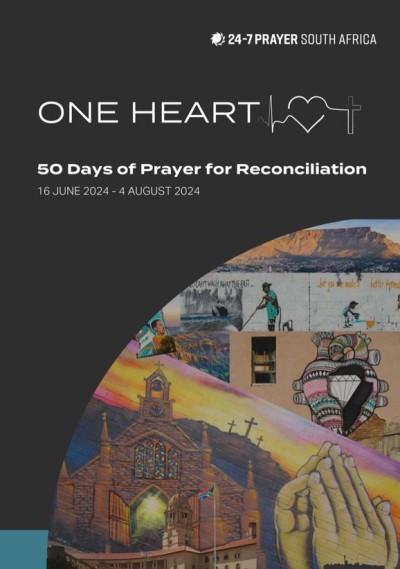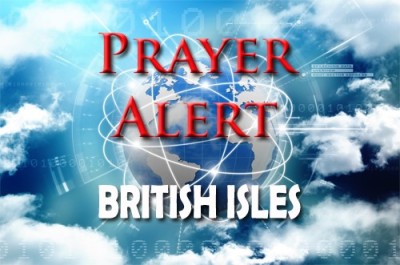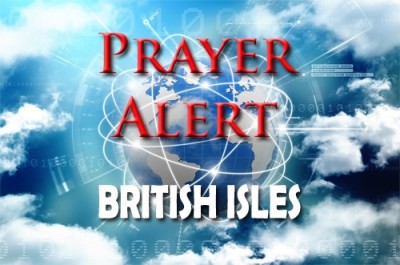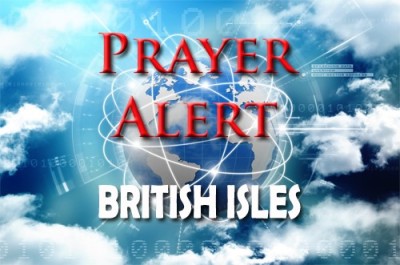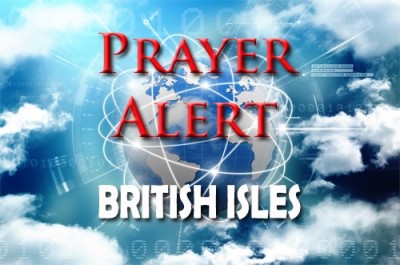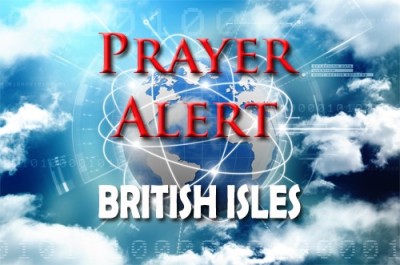50 Days of Prayer for Oneness and Reconciliation
“FATHER, MAKE THEM ONE” – John 17
The time is right for the Church to take the lead and assist our countries to heal. As Christians we owe the world a testimony. Let us move from fear, hatred and distrust to rebuilding the ruined walls, as in Nehemiah’s time, helping each other to overcome the past and walking in faith, believing that the King of Kings is still empowering us. Let us celebrate our shared identity in Christ.
We cannot change, transform or heal ourselves. Only the Triune God can do that. But then we need to spend time with Him and allow Him to speak to us.
In light of the need for healing and reconciliation and for our hearts to be prepared, this 50 Days of Prayer was initiated.
The 50 Days will start on 16 June and end on 4 August 2024.
Please join in this process of humbling ourselves before God so that God Himself can heal and reconcile us with Him and with one another.
More info / Download: https://jwipn.com/one-heart-prayer-for-reconciliation-16-jun-4-aug/
Cross necklace saves man’s life
03 Jul 2025Aidan Perry, a 20-year-old man from Florida, is praising God for saving his life after he was accidentally shot in the chest at close range on 7 June. The incident occurred when a friend was showing off a .40-calibre pistol that unexpectedly discharged. In the terrifying moments afterward, Aidan recalled seeing blood and fearing he would die. However, he credits both divine intervention and his cross necklace - a Christmas gift from his father - for his survival. Doctors confirmed that the necklace had deflected much of the bullet’s force, causing it to ricochet and lodge harmlessly in Aidan’s chest rather than striking vital organs. Aidan, who already had faith before this incident, said the experience has deepened his belief in God, reminding him to ‘never stop believing’. Meanwhile, the friend involved has been arrested and charged with culpable negligence causing injury.
Remembering street evangelist Holy Hubert
03 Jul 2025Holy Hubert Lindsey, a fiery street evangelist, left an indelible mark on UC Berkeley in the turbulent 1960s and ‘70s. Born in Georgia in 1914 and converted at fifteen, Hubert sensed a divine call to preach boldly, even barefoot if needed. Drawn to Berkeley amid anti-war protests and cultural upheaval, he proclaimed repentance and Christ’s grace in Sproul Plaza, enduring jeers, violence, and scorn. In 1965, he was beaten unconscious yet returned swiftly, bullhorn in hand, declaring, 'They can bruise the body, but the soul is under the Shepherd’s care’. Many considered him a precursor to the Jesus Movement, as his preaching forced students to confront deeper spiritual questions. Despite opposition, he remained resolute, often tearfully urging listeners to turn to Christ. Hubert rejected media fame, choosing a humble life focused on the Gospel. He passed away in 2003, remembered as a courageous voice for Christ amid moral confusion.
Financial markets reacted sharply this week after Rachel Reeves appeared tearful during Prime Minister’s Questions, after the Government’s sudden U-turn on welfare reforms. Sterling fell by 1% against the dollar, while UK borrowing costs surged in one of the largest single-day moves since the market turmoil following Liz Truss’s 2022 mini-budget. The welfare reversal has left an almost £5 billion gap in Reeves’s fiscal plans, prompting investor concerns about how the Government will balance the books. While Downing Street insisted Reeves retains Starmer’s full support, analysts say the episode highlights market anxiety over potential leadership instability and future fiscal policy. Speculation mounted about possible tax rises in the autumn, though ministers reiterated pledges not to increase income tax, VAT, or National Insurance. Despite the turbulence, experts noted that markets are not as fragile as during the 2022 crisis.
MPs vote to proscribe Palestine Action
03 Jul 2025MPs have voted overwhelmingly to proscribe Palestine Action as a terrorist organisation under the Terrorism Act 2000, with 385 in favour and 26 against. Home secretary Yvette Cooper defended the move, stating that violence and serious criminal damage have no place in legitimate protest. Critics, however, warn that the decision could chill free expression, likening it to punishing suffragette-style activism. The move follows incidents such as activists vandalising planes at RAF Brize Norton and blockading defence firm Elbit Systems, aiming to disrupt UK arms links to Israel. Protesters outside Parliament condemned the Government for hypocrisy and accused it of suppressing effective dissent. Palestine Action insists its tactics, though disruptive, are non-violent and necessary to oppose alleged human rights abuses in Gaza. However, once the ban is approved by the House of Lords, membership or support of the group could carry prison sentences of up to fourteen years. The decision has sparked fierce debate over balancing security and civil liberties.
Keir Starmer has unveiled an ambitious ten-year plan to transform the NHS by shifting healthcare from hospitals to local communities. Central to the proposal are 200 new 'neighbourhood health centres', offering scans, outpatient services, mental health support, and more - all aimed at reducing hospital demand. Starmer declared the NHS must 'reform or die’, pledging accessible, community-based care under one roof. Health secretary Wes Streeting promised thousands more GPs, reversing current trends favouring hospital consultants, and aims to slash waiting lists while prioritising British doctors for NHS jobs. The plan also includes an enhanced NHS app, AI safety alerts, and a focus on helping patients return to work. However, experts express caution, noting that past governments have announced similar visions without delivering meaningful change. Questions remain over funding, but Starmer insists the plan will 'fundamentally rewire' healthcare and prioritise patient-centred care, especially in deprived areas.
Labour’s welfare reform bill was plunged into turmoil after the government dropped plans to tighten eligibility for PIP, one of its core cost-saving measures. Facing fierce backlash and the threat of a major rebellion, Disability minister Sir Stephen Timms announced that changes to PIP would be delayed pending a full review, co-produced with disabled people. The last-minute concession has caused confusion among MPs, leaving uncertainty over the bill’s financial viability. Despite earlier compromises, numerous Labour MPs remain opposed, warning the reforms could deepen poverty and harm disabled people. Emotional speeches in Parliament underscored divisions, with some MPs moved to tears as they denounced the bill as unjust. Critics argue the concessions feel rushed and insufficient, while government ministers insist reforms are vital to sustain the welfare system. Poverty impact assessments indicate that even with changes, around 150,000 more people could be pushed into poverty by 2030. The fate of the bill remains uncertain as further votes loom and disquiet grows within Labour ranks.
Prosecutors are considering bringing further charges against Lucy Letby, the former neonatal nurse already serving fifteen whole-life sentences for murdering seven babies and attempting to murder seven more between 2015 and 2016 at the Countess of Chester Hospital. The Crown Prosecution Service confirmed it has received a full file of evidence from Cheshire Police regarding additional deaths and non-fatal collapses of infants at both the hospitals where Letby had placements in 2012 and 2015. Meanwhile, three former senior managers at the Countess of Chester have been arrested on suspicion of gross negligence manslaughter after a separate investigation into systemic failures at the hospital. A public inquiry into how Letby was able to commit her crimes continues, with its final report expected early next year. Her legal team maintains her innocence, citing international medical experts who attribute the babies’ deaths to poor medical care and natural causes. The Criminal Cases Review Commission is reviewing her convictions for potential miscarriage of justice.
